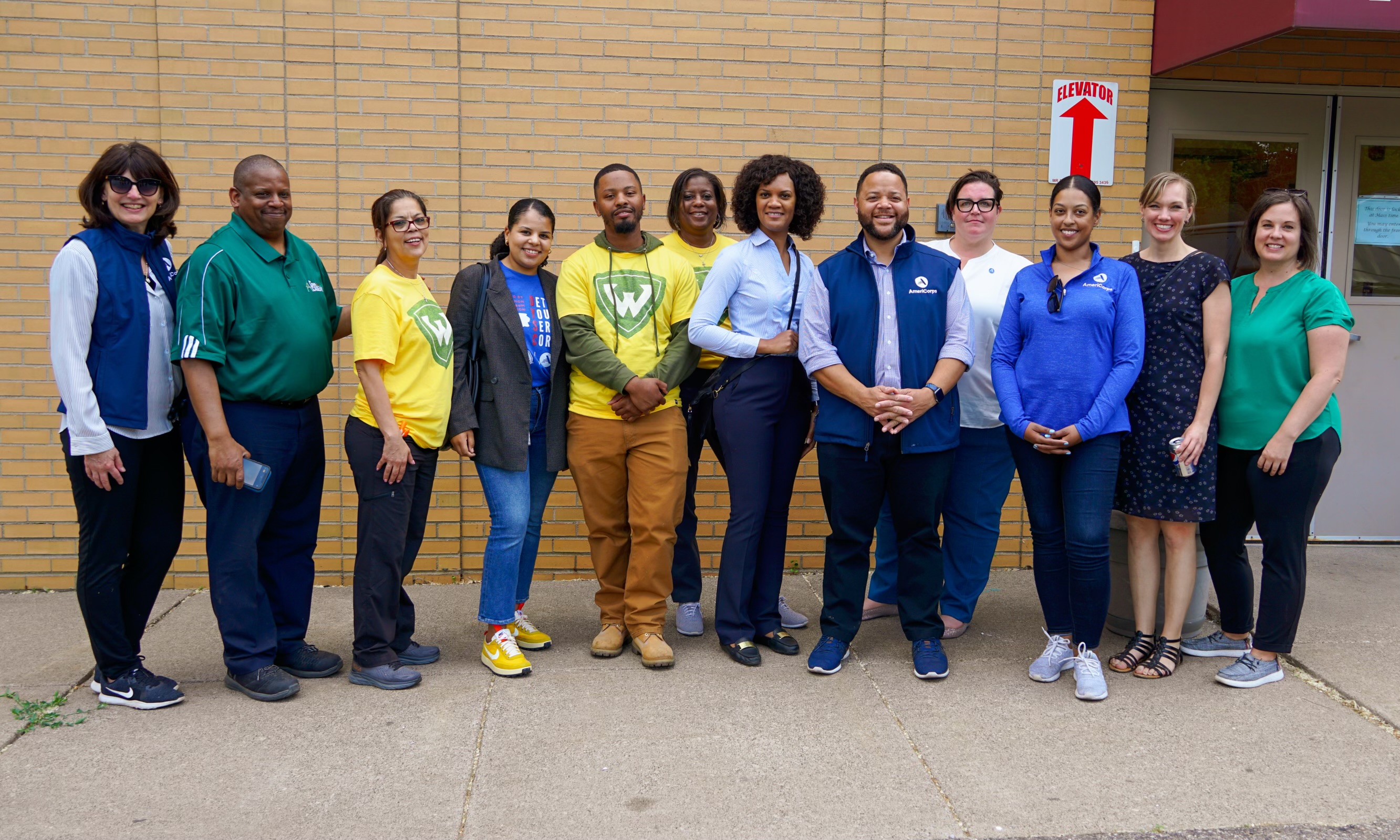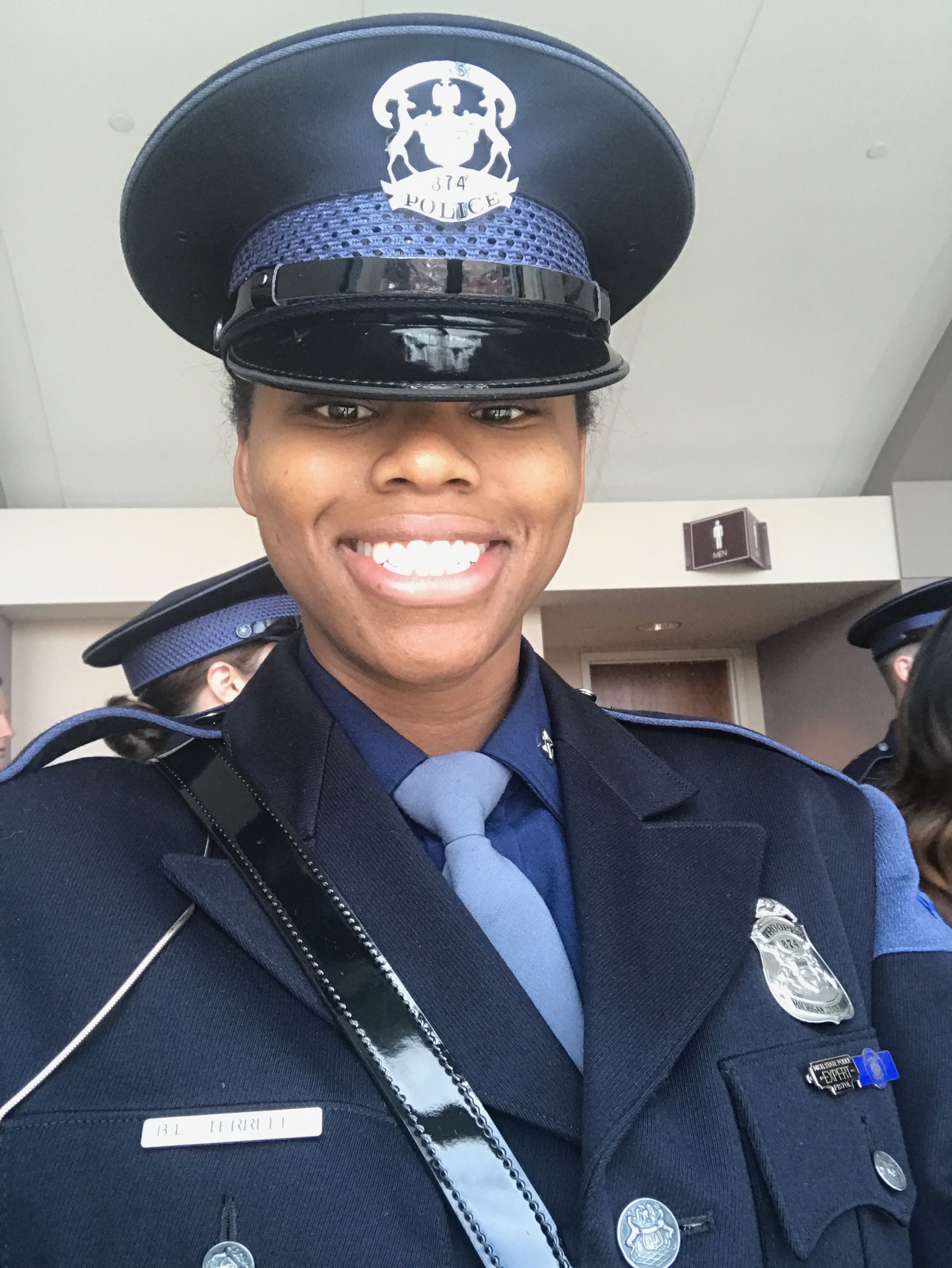More than 66,000 AmeriCorps members and AmeriCorps Seniors volunteers supported health needs across the nation last year.
During AmeriCorps' 30th anniversary, we celebrate members and AmeriCorps Seniors volunteers who improve the physical and mental well-being of Americans.
National service programs, like the AmeriCorps Urban Safety Program, enhance and set better health standards for individuals, families, and communities. According to the AmeriCorps return on investment study, AMUS reduced costs and increased economic benefits to society from lessened criminal activity in neighborhoods.
Safeguarding Detroit
Wayne State University Center for Urban Studies in Detroit, Mich., began efforts to improve public safety across communities in 2008. By the summer of 2009, the Center's response to rising crime, poor police response, a high unemployment rate, the foreclosure crisis, and the national recession was to create the AmeriCorps Urban Safety Program. The goal of AMUS was to increase public safety through layered deterrence strategies. In the fall of 2010, AmeriCorps members hit the ground running to:
- improve levels of neighborhood guardianship through the establishment of community block clubs and citizen crime monitoring;
- reduce victim attractiveness and susceptibility by conducting workshops, providing home safety assessments, and handing out informational leaflets detailing recent crime activity; and
- provide technical assistance to residents for wireless internet connections to improve communications among citizens and use modern tools to help reduce neighborhood crime.
In the first year of the AMUS, program efforts contributed to a 14% reduction in crime numbers. Since then, the program has continued to evolve and meet the community's needs.
- During the early days of the COVID-19 pandemic, AmeriCorps members quickly pivoted to meet rapidly changing community needs, adapting program processes to distribute food, deliver daily necessities, and provide vaccination and contact tracing support to city agencies.
- In 2020, AMUS expanded its Home Safety Assessment project, previously focused on children and the general population, to introduce the Detroit Older Adult Home Safety Assessment Project to serve adults 60 and older. The program helped reduce household hazards that impact home stability, respiratory and pulmonary-cardiovascular health, and fall injuries, having completed 402 assessments and provided 7,000 safety intervention items that improve safety for older adults.
- In 2023, AmeriCorps members in AMUS participated in 13 large-scale distributions of filters through the Water Filter Education Project across Action Level Exceedance communities, where drinking water contains lead in amounts that exceed the regulatory action level. Members distributed more than 5704 water filters through their door-to-door canvassing efforts.
A healthy future for the community and AmeriCorps members
One of the most significant AMUS additions has been the implementation of the Detroit Youth Summer Corps launch in 2015. The summer program engages fifty at-risk, 17–24-year-old individuals for a 10-week term of AmeriCorps service with the AMUS Program. Participants are recruited from and serve in the community. As a Service Team, they collaborate in community revitalization activities, boarding up vacant and open homes and cleaning up blighted properties, canvass Action Lead Exceedance communities to offer water filtration products, and conduct Healthy Home Screening Tool Assessments alongside AMUS staff members. In the final week of the summer, students stage and conduct a Community Safety Fair event.
Not only this, but the summer program also ensures participating youth can build their healthy futures. DYSC hosts seminars twice a week to build skills for success in post-secondary education and employment, helping them navigate college applications, access financial aid, and gain personal and professional skills and resources for networking and resume building. AmeriCorps' study found that AMUS's summer employment program helped reduce lifetime spending on the criminal justice system, with AmeriCorps youth members less likely to commit violent or property crimes and the likelihood of increased employment by the summer program participants.
To date, more than 739 AmeriCorps members have completed 1,039 of service with the AMUS and DYSC, serving more than 510,000 hours to the Detroit community. These members have made a significant difference not only in their communities but also in their lives.
Before becoming Detroit City Council Member for District 4, Latisha Johnson was an AmeriCorps member who served with AMUS because she “wanted to help build collective power within our neighborhoods by building block clubs.”

"I joined AmeriCorps while studying criminal justice and psychology because it offered a different approach to public safety. As opposed to law enforcement, AMUS sought to decrease crime by increasing public safety. My team and I were able to reach community residents, advise them of ongoing crime trends, and provide deterrents to reduce the likelihood of victimization. My term of service with AMUS enabled me to take the knowledge obtained through education and apply it directly to serving community residents. My experience with the program was a catalyst for personal growth and provided a deeper understanding of how rewarding selfless service could be for myself and others within the community. The confidence and experience gained through my term of service with AMUS led me to become a police officer in Detroit. As a police officer, today I mentor at-risk youth, provide them with occupational, vocational, and educational resources, and have round table discussions on character development and leadership principles every week. AMUS was instrumental in my personal and professional development and provided positive affirmations of the benefits of service," said AmeriCorps alum David.

Like David, AmeriCorps alum Beatrice also found her future career through service. "I joined AmeriCorps because I wanted to work in the community I grew up in. I also wanted guidance on what I should truly do in my career. Being hands-on in the community was different for me, and I wanted to try something new. My most memorable moment during my service was cleaning up blight in the park with current and retired police officers, other members of the neighborhood, and AmeriCorps. I really enjoyed interacting with the community, but I enjoyed speaking to the officers the best. They gave me clarity on my future career in policing and gave great advice on different people to speak to."

A movement to ensure healthy futures for all
For the past 30 years, AmeriCorps has addressed our nation's urgent health needs, from mitigating the impacts of the COVID-19 pandemic and other public health crises to ensuring our older adults can age in place with dignity, especially in underserved communities. AmeriCorps programs like AMUS continue to provide all Americans and those who serve access to the resources they need to secure a healthy future.



